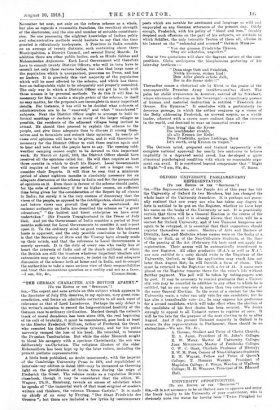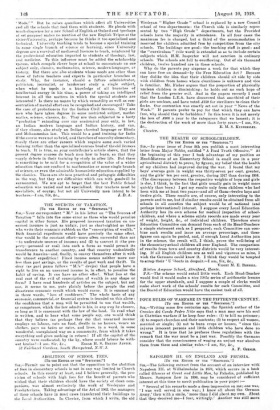UNIVERSITY OPPORTUNITIES.
(To THE EDITOR Or THE " SPECTATOR.")
&a,—It is not necessary to be an Oxford man to approve and enjoy the frank loyalty to his University of your contributor, who is obviously none the worse for having been "Twice Ploughed for
Mode.'" But he raises questions which affect all Universities and all the schools that feed them with students. He pleads with much eloquence for a new School of English at Oxford and (perhaps of set purpose) makes no mention of the new English Tripos at the sister-University, perhaps because he thinks it too specialized and technical. University teaching tends to become a special training in some single branch of science or learning, since University degrees are a survival of mediaeval licences to teach, reinforced by the professional education imparted to students of theology, law, and medicine. To this influence must be added the scholarship System, whch compels clever boys at school to concentrate on one subject only, classics, mathematics, science, modern languages, or history. But there are also students whose needs are other than those of future teachers and experts in particular branches ot study. Why, for instance, should a future administrator, politician, journalist, or landowner study a single subject, when • what he needs is a knowledge of all branches of intellectual energy in his time, a power of taking an intelligent interest in all the matters in which the special students are interested ? Is there no means by which versatility as well as con- centration of mental effort can be recognized and encouraged ? Take the case of probationers for the Indian Civil Service. They are men who have taken degrees in some restricted subject, mathe- matics, science, classics, &e. They are then subjected to a hasty "probation" extending over one academical year only, in law, an Indian modern language and Indian history, and can, if they choose, also study an Indian classical language or Hindu and Mohammedan law. This would be a good training for India if the course were not so brief, and thereforeof necessity elementary. Surely there are other careers which require some such varied training rather than the specialized courses bred of the old licences to teach. It is true, as your contributor's article shows, that the present degree courses do teach men how to learn, so that they supply defects in their training by study in after life. But there is something to be said for a recognition of the value of a wider education than one confined to mathematics or some single branch of science, or even the admirable humanistic education supplied by the classics. There are obvious practical and pedagogic difficulties in the way, but they are difficulties which can with goodwill be surmounted. We are apt to forget that the best Public School education was varied and not specialized. Our teachers must be specialists, of course; but not all University men intend to be



































 Previous page
Previous page